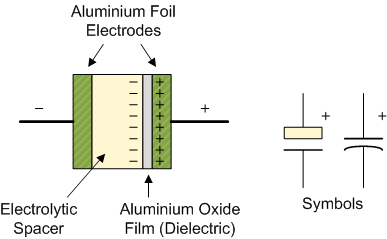We all know about electric current, conductance, and resistance. But, the capacitance is another important part of understanding the concept of electricity. You possibly have heard that no one can store electricity. However, capacitors are capable of storing electric charge. In this chapter, we will look more at the concept of capacitors and capacitance. Let us first start with the capacitor.
Suggested Videos
What is a Capacitor?
Capacitors are also known as Electric-condensers. A capacitor is a two-terminal electric component. It has the ability or capacity to store energy in the form of electric charge. Capacitors are usually designed to enhance and increase the effect of capacitance. Therefore, they take into account properties like size and shape. The storing capacity of capacitance may vary from small storage to high storage.
Learn Energy stored in a Capacitor here.
Capacitance
Capacitance is nothing but the ability of a capacitor to store the energy in form of electric charge. In other words, the capacitance is the storing ability of a capacitor. It is measured in farads.
Construction of Capacitor
Most capacitors usually contain two electrical conductors. These conductors are separated by metallic plates. Conductors may be in form of electrolyte, thin film, a sintered bead of metal etc.
Capacitor Rating
The capacitance value of two different capacitors may exactly be the same and the voltage rating of the two capacitors are different. Let us take two capacitors, one which has a small voltage rating and other with high voltage rating. If we substitute a smaller rated voltage capacitor in place of a higher rated voltage capacitor, the smaller capacitor.
This can happen because of the unexpected increases in voltage. The common working DC voltage of capacitors are usually 10V, 16V, 25V, 35V, 50V, 63V, 100V, 160V, 250V, 400V and 1000V.
Characteristics of Capacitors
The properties or characteristics of capacitors may differ from one another. Few characteristics of capacitors are:
Capacitance (C)
Capacitance is the basic and important characteristic of a capacitor. We measure it in pico-Farads (pF), nano-Farads (nF) or micro-Farads (µF). Usually, we can find this value printed on the capacitor body in form of a number or text. Hence, you can get this value easily. You can see capacitance in the Solved example below.
Working Voltage
The total amount of direct current (DC) or alternating current (AC) is applied to a capacitor without any failure in the capacitor’s whole lifetime. Working Voltage defines this statement.
Tolerance
Just like the voltage rating, capacitors also have a tolerance rating. They vary from plus to minus value.
Leakage Current
The capacitors Leakage Current is the small DC current flow in the region of Nano-Amps (nA). Leakage current is a result of electrons physically making their way through the dielectric medium. It could also be the movement around its edges or across its leads. Therefore, these electrons can fully discharge the capacitor over time if you remove the supply voltage.
You can download Capacitors and Capacitance Cheat Sheet by clicking on the download button below

Solved Examples for You
Question: Write about the capacitance of an isolated conductor.
Answer: When we give charge to a conductor, its potential increases. We see that for a conductor, the potential of the conductor is proportional to charge given to it.
q = charge on conductor
V = potential of the conductor. Therefore, the charge will be proportional to the potential, and we may write:
q \(\propto\) V
Hence, q = CV
Where C is the proportionally constant or the capacitance of the conductor. If the value of C is large, the capacitor can store more ‘q’ and if the value of C is small, q will be small. Hence, this constant gives us a measure of the amount of charge that a capacitor can store.








Leave a Reply